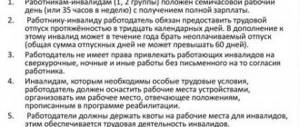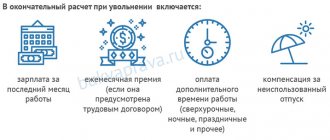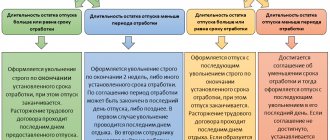Types of disability benefits
People who are unable to work due to disability are provided with the following types of financial support:
- The social pension is intended for those who have not accumulated insurance coverage. Can be received by minors, pensioners, citizens who have lost their breadwinner.
- A labor pension is assigned as compensation for the lost opportunity to receive income. To receive this type of payment, you must have a minimum length of service – at least 1 day.
- The state pension is accrued depending on the length of service to cosmonauts, military personnel, victims of man-made accidents, participants of the Second World War, as well as survivors of the blockade.
Who is entitled to disability benefits in 2021?
All disabled people who have officially confirmed their status can count on receiving disability payments.
The medical institution issues a conclusion about a persistent decline in health; you will regularly have to undergo a commission again so that the doctor can make sure that there is no improvement. Depending on the state of health in the Russian Federation, several disability groups are distinguished:
| Disability group | Characteristics and Features |
| First | A disabled person is completely dependent on third parties; he cannot navigate in space, control himself, or move. |
| Second | A disabled person can work with the help of auxiliary tools, orient himself in space, and is able to move. |
| Third | There is a serious illness that does not interfere with working with loyal demands. |
| Disabled children | There is no division into groups for people under 18 years of age. |
These categories of citizens can count on payment of benefits in the established amount. They are provided with additional benefits and are assigned monthly and one-time disability benefits.
Debit card All inclusive from Fora-Bank
Apply now
The procedure for terminating an employment contract with disabled people of groups 1, 2 and 3
Issues of employment and dismissal of disabled people are regulated not only by labor legislation , but also by the Federal Law of November 24, 1995 No. 181 “On the social protection of disabled people in the Russian Federation”, and by Order of the Ministry of Labor of Russia of November 9, 2017 No. 777, which establishes recommendations for identifying discrimination in relation to employees with a disability group.
Is it possible to fire a disabled person? Do they have the right?
Based on paragraphs. “m” clause 2 of the Order, it is impossible to dismiss an employee who has been diagnosed as disabled if the reason for termination of the employment contract is the very fact of the existence of the group, and not a medical prohibition or other legal reasons.
First of all, it is necessary to determine what limitations disabled people of each group have (in accordance with Government Decree No. 95 “On the procedure and conditions for recognizing a person as disabled” and Order of the Ministry of Labor of Russia dated December 17, 2015 No. 1024n).
Group I is established for citizens who have a 90-100% impairment of body functions. Disabled people in this category are recognized as completely disabled, but it is impossible to prohibit such a citizen from working if he does not have mental disabilities and at least partially moves (for example, his hands function), if the position has all the conditions for normal work, and if there are no grounds for dismissing the employee for health.
Group II implies a permanent loss of health by 70-80%. In some cases, this category is also considered non-working, but a ban on work can only be established on the basis of a doctor’s testimony. The employer is required to create all the necessary conditions for the comfortable work of a disabled employee.
But group III is considered working. The citizen loses his health by 40-60% , but is still able to move and work independently, but with some restrictions, special devices may be needed (for example, an inhaler, orthopedic shoes, etc.).
The reason for the dismissal of employees of disability groups 1 or 2 may be a doctor’s testimony that limits work or excludes any workload altogether, or a health limitation that has arisen does not allow him to perform work functions. In this case, the first step of the head of the organization is not to issue an Order to terminate the contract, but to offer the employee a more suitable position for him. Dismissal will occur if the disabled employee refuses the new working conditions in writing, or if there are simply no vacancies.
Medical indications most often do not prevent a disabled person of group 3 from working, so dismissal can occur on any of the grounds specified in Chapter 13 of the Labor Code of the Russian Federation.
Important! It is possible to fire a disabled person, but this requires legal grounds. Dismissal of a person due to disability (as grounds for termination of an employment contract) is unacceptable. Only for medical reasons.
itself , in fact, is carried out in accordance with the general procedure specified in Art. 84.1 Labor Code of the Russian Federation:
- the emergence of grounds for termination or termination of the employment contract;
- publication by the head of the organization of the Order;
- registration of personnel documents (work book and personal file);
- Calculation of payments upon leaving work.
Sequencing
The head of the organization is required to strictly comply with labor legislation. If the labor inspectorate often does not notice a violation of the rights of ordinary workers (if they have not filed a private complaint), then people with disabilities are treated with great attention.
- Offer a more suitable position (if the dismissal is not related to the employee’s guilty actions, for example, appearing drunk).
- Correctly draw up the Order and all personnel documents.
For the Order, you can use the unified form T-8 (Decree of the State Statistics Committee No. 1) or develop a company letterhead.
By preparing personnel documents we mean a work book and a personal card.
The work book is drawn up according to the rules established by Resolution of the Ministry of Labor of Russia No. 69 (columns 1 and 2 - serial number of the entry and date, columns 3 and 4 - reason for dismissal in accordance with the article of the Labor Code of the Russian Federation and a link to the Order of dismissal).
After registration, the document is handed over to the dismissed person.
A personal card is established using the T-2 form or an individual form. Section 9 contains information about the reasons for dismissal and a link to the Order. The employee must leave his signature below the information.
- Calculation.
The accounting department makes the calculations. Payments, as a general rule, include only wage balances and compensation for unused vacation days, and in some cases, severance pay. Payments will be discussed in more detail below.
One-time disability benefit
A one-time cash payment to disabled people is financial support from the state, which can be expressed both in cash and in kind. A person has the right to choose the form of a one-time benefit.
What is included in EDV in kind:
- city telephone service;
- travel to the sanatorium once a year;
- social services;
- Dental prosthetics once every 5 years.
In material equivalent, EDV is paid in an amount depending on the disability group:
- for the first group – 3897 rubles;
- for the second group – 2783 rubles;
- disabled person of group 3 – 2228 rubles;
- minor citizens – 2783 rubles. (the amount does not depend on the group).
The recipient has the right to refuse assistance in kind in full, or from any specific type of service, replacing it with cash support.
Personal income tax on payments to disabled employees
A disabled employee may be provided with standard tax deductions:
- 500 rubles per month. They can use it:
- disabled people of groups 1 and 2;
- disabled children.
- 3000 rubles per month. The following are entitled to it:
- Disabled people affected by nuclear weapons testing and radiation accidents;
- disabled people of the Great Patriotic War;
- disabled people of all groups assigned as a result of wounds, injuries or contusions received during the defense of the USSR or the Russian Federation.
- These deductions do not depend on the amount of annual income.
- If the nature of the disability allows you to qualify for both benefits, then the employee is provided with the greater of them.
Personal income tax is also not assessed on:
- amounts spent by the organization on the purchase of technical means of prevention and rehabilitation of disabled workers;
- no more than 4,000 rubles of financial assistance to former disabled employees who have retired (amount over 4,000 rubles is taxable);
- the cost of vouchers for treatment in health-improving and sanatorium-resort institutions;
- The reimbursed cost of medicines is within 4000 rubles.
The benefit for medicines is valid if they are prescribed by a doctor and there are documents confirming the purchase.
Disability insurance payment
Paid if two conditions are met:
- There is any disability group.
- I have experience.
The disability insurance pension depends on several factors:
- groups;
- duration of employment;
- fees paid;
- presence in the family of persons under care;
- region of residence.
The amount of the insurance pension includes a fixed part, which is determined by the government and indexed every year. As of January 1, 2019, its value ranges from 3,467 to 24,003 rubles. The amount of disability benefits is calculated taking into account the group, family and social status, and length of service.
Classic debit card from SberBank
Apply now
Grounds for dismissal of a disabled person of group 1
Obtaining disability and assigning a group is regulated by Federal Law No. 181 of November 24, 1995. A medical report on health and degree of disability is provided by the following organizations:
- Clinical expert commissions , which include specialists who evaluate human health problems and establish acceptable working conditions in connection with them;
- Medical and Social Expert Commission (MSEC) - assigns disability, determines to what extent the ability to work has been lost. Provides cards for the rehabilitation program, which identify lost skills and possible working conditions for the person.
The form of medical certificates is standard, established by law. A sample conclusion is shown in the photo.
Next, the employer is provided with an IPR card indicating the degree of disability.
Disability benefit for group 1 in 2021
The amount of the fixed payment to the disability insurance pension of group I is 5,686 rubles 25 kopecks per month.
Amount of fixed payment to the disability insurance pension of group I
| Category of pension recipients | The amount of a fixed payment to the disability insurance pension, taking into account increases to it |
| Disabled people of group I | Without dependents - 11,372 rubles 50 kopecks per month With 1 dependent – 13267 rubles 92 kopecks per month With 2 dependents – 15163 rubles 34 kopecks per month With 3 dependents – 17058 rubles 76 kopecks per month |
| Citizens living in the Far North and equivalent areas | The fixed payment to the disability insurance pension and increases to it are increased by the corresponding regional coefficient |
| Group I disabled people who have worked for at least 15 calendar years in the Far North and have an insurance record of at least 25 years for men or at least 20 years for disabled women | Without dependents - 17058 rubles 76 kopecks per month With 1 dependent - 19901 ruble 89 kopecks per month With 2 dependents - 22745 rubles 02 kopecks per month With 3 dependents - 25,588 rubles 15 kopecks per month (regardless of place of residence) |
| Group I disabled people who have worked for at least 20 calendar years in areas equated to the regions of the Far North, and have an insurance record of at least 25 years for men or at least 20 years for women | Without dependents - 14,784 rubles 26 kopecks per month With 1 dependent - 17,248 rubles 31 kopecks per month With 2 dependents - 19,712 rubles 35 kopecks per month With 3 dependents - 22,176 rubles 40 kopecks per month (regardless of place of residence) |
The fixed part, taking into account regional coefficients, is paid regardless of the place of residence of the person at the time of payment. Thus, in order to receive an increased insurance payment for work in the Northern regions and equivalent regions, it is not at all necessary to live there.
One-time cash payments amount to RUB 3,897 . The amount is paid only if the recipient has issued an EDV in cash and not in kind.
What benefits are available to disabled people of group 1:
- To pay utility bills (50%).
- Housing subsidy.
- For education.
- Free travel on city public transport, and a half discount on the cost of travel on other types of transport.
- A trip to a sanatorium, medications and medicines, prosthetics.
- Social services: nurse, discounts on funeral services, etc.
Persons who have lost the ability to work as a result of military operations, as well as prisoners of concentration camps, receive additional monthly material support (DEMO) in the amount of 1 thousand rubles.
DEMO for disabled people of the Second World War and residents of besieged Leningrad is 500 rubles.
With an income below the subsistence level, a group 1 disabled person has the right to a federal social subsidy (FSD). Its size varies depending on the region.
We provide the employee with “general” disability benefits
Working disabled people have the right to enjoy the following benefits:
- Shortened work week.
Up to 35 hours per week with a working day of no more than 7 hours.
The rehabilitation program may specify other restrictions.
A working day may be:
- 7 hours for a five-day week;
- with a six-day week - 5 days a week for 6 working hours and on the eve of the day off a shortened 5-hour day.
A reduction in working hours is mandatory only for disability groups 1 and 2. Group 3 employees have the right to have a week shortened only if this is indicated in the IPR.
- Full payment.
Even if working hours are reduced, the work of a disabled person is paid in full.
- Extended annual leave.
A disabled employee has the right to labor leave of 30 calendar days.
Extended leave is due even if the employee did not have a disability during the working year.
In addition, he has the opportunity to take unpaid leave during the year, but not more than 60 days per year. The time of additional leave is determined by both parties.
If the employee brings the disability certificate later, the employer must amend the employment contract with an additional agreement. Moreover, the additional agreement is drawn up for the date when the employer was provided with documents confirming the disability.
In this case, the benefit for extended leave is provided for the entire time that he is recognized as disabled, regardless of when he informed the employer about this.
- Involvement in night work, overtime work, as well as work on weekends is possible only with the written consent of the employee.
Regardless of the consent of the disabled person, he should not be involved in overtime work if the IRP prohibits this (and the employer is familiar with it).
- Compliance with special working conditions specified in the IPR.
If the rehabilitation program provides for a special organization of the disabled person’s workplace with specialized devices, the employer must fulfill these requirements.
- Protection against layoffs and layoffs during staff reductions.
- Payment of sick leave.
Example. Calculation of the hourly wage rate for a disabled employee
If a disabled person’s salary is calculated at an hourly rate, then its size should be increased by a coefficient (K), which is calculated using the formula:
Given:
According to the IPR, the working week should be 30 hours. The hourly rate for similar work performed under normal conditions is 110 rubles. It is required to calculate the hourly wage rate of a disabled employee.
Solution:
- The magnification factor is calculated:
- Taking into account the coefficient, the hourly tariff rate of a disabled person is determined:
Disability benefit for group 2 in 2021
The amount of the fixed payment to the disability insurance pension of group II is 5,686 rubles 25 kopecks per month.
Amount of fixed payment to the disability insurance pension of group II
| Category of pension recipients | The amount of a fixed payment to the disability insurance pension, taking into account increases to it |
| Disabled people of group II | Without dependents – 5686 rubles 25 kopecks per month With 1 dependent – 7581 rubles 67 kopecks per month With 2 dependents - 9477 rubles 09 kopecks per month With 3 dependents - 11372 rubles 51 kopecks per month |
| Citizens living in the Far North and equivalent areas | The fixed payment to the disability insurance pension and increases to it are increased by the corresponding regional coefficient |
| Disabled people of group II who have worked for at least 15 calendar years in the Far North and have an insurance record of at least 25 years for men or at least 20 years for women | Without dependents - 8529 rubles 38 kopecks per month With 1 dependent – 11372 rubles 51 kopecks per month With 2 dependents - 14215 rubles 64 kopecks per month With 3 dependents - 17058 rubles 77 kopecks per month (regardless of place of residence) |
| Disabled people of group II who have worked for at least 20 years in areas equated to the regions of the Far North, with insurance experience of at least 25 years for men or at least 20 years for women | Without dependents - 7392 rubles 13 kopecks per month With 1 dependent - 9856 rubles 18 kopecks per month With 2 dependents - 12320 rubles 22 kopecks per month With 3 dependents - 14,784 rubles 27 kopecks per month (regardless of place of residence) |
The EDV size is RUB 2,783.
The DEMO size is the same as for disabled people of group 1 - 1000 and 500 rubles, depending on the status of the recipient. Federal subsidies are paid provided that the citizen’s income is below the subsistence level.
Privileges:
- Free travel on public transport.
- 50% discount on travel on other types of transport.
- Visit the sanatorium once a year.
- Benefits for medicines.
- Free prosthetics.
- For education.
- Free medical devices and drugs that provide a decent standard of living: hearing aids, orthopedic shoes, etc.
- 50% discount on housing and communal services.
Also, disabled people of group 2 have the right to improve their living conditions - they can take advantage of a housing subsidy to purchase real estate.
Classic debit card from SberBank
Apply now
Legal aspects
The working relationship between an employee and an enterprise is regulated by the Labor Code of the Russian Federation. It reflects legal aspects that make it possible to resolve disputes arising between the parties, including those caused by dismissal. It refers to the end of the business relationship between the employee and the employer.
From the moment of dismissal, the employment contract is considered terminated, and the parties are released from mutual obligations. The employee has the right not to fulfill professional duties, and the employer has the right not to pay remuneration.
In addition to the Labor Code, regulation of the dismissal process is reflected in the Law “On Employment in the Russian Federation”, sectoral and territorial legal acts.
Main types of termination of working relationships:
- At the request of the employee;
- By decision of the employer;
- By agreement of the parties.
The grounds for ending an employee’s professional activity are specified in Article 77 of the Labor Code of the Russian Federation. A significant reason for terminating a business relationship is the employee’s loss of health, confirmed by a medical report that must be provided to the employer.
The standard algorithm of actions upon dismissal consists of the following steps:
- Receiving an application from an employee or drawing up an agreement;
- Preparation of the order, informing the employee;
- Accrual of payments provided for by law;
- An entry in the work book corresponding to the situation, which is returned to the employee on the day of dismissal, with a copy placed in the archive.
The process for ending an organization's working relationship with a disabled person is similar, but has some nuances. The group assigned to the employee (1,2,3), the degree of health loss, and the ability of the enterprise to create optimal conditions for the person are taken into account.
A citizen may be partially limited in work or completely disabled. For example, any disability group assigned to the 3rd degree of health loss indicates the absolute impossibility of professional activity and serves as a basis for terminating a business relationship with a disabled person in connection with medical testimony.
Disability benefit for group 3
The fixed payment to the disability insurance pension of group III is 2843 rubles 13 kopecks.
Table title
| Category of pension recipients | The amount of a fixed payment to the disability insurance pension, taking into account increases to it |
| Disabled people of group III | Without dependents - 2843 rubles 13 kopecks per month With 1 dependent - 4738 rubles 55 kopecks per month With 2 dependents - 6633 rubles 97 kopecks per month With 3 dependents - 8529 rubles 39 kopecks per month |
| Citizens living in the Far North and equivalent areas | The fixed payment to the disability insurance pension and increases to it are increased by the corresponding regional coefficient |
| Group III disabled people who have worked for at least 15 calendar years in the Far North and have an insurance record of at least 25 years for men or at least 20 years for women | Without dependents - 4264 rubles 70 kopecks per month With 1 dependent - 7107 rubles 83 kopecks per month With 2 dependents - 9950 rubles 96 kopecks per month With 3 dependents - 12794 rubles 09 kopecks per month (regardless of place of residence) |
| Group III disabled people who have worked for at least 20 years in areas equated to the regions of the Far North, and have an insurance record of at least 25 years for men or at least 20 years for women | Without dependents - 3696 rubles 07 kopecks per month With 1 dependent - 6160 rubles 12 kopecks per month With 2 dependents - 8624 rubles 16 kopecks per month With 3 dependents - 11088 rubles 21 kopecks per month (regardless of place of residence) |
Also, persons in this group are entitled to:
- EDV – 2228 rub.
- DEMO – from 500 to 1000 rubles.
- Federal subsidy (if a disabled person receives a minimum income below the minimum wage).
Privileges:
- Discount on housing and communal services payments (50%).
- Right to housing subsidy.
- Free travel on public transport.
- Visit to the sanatorium with a 50% discount.
- 50% discount on medications (for certain medications).
- Benefits for training.
For working disabled people, increased leave of up to 60 days and a shortened working week of 40 hours are provided. Dismissal of a disabled worker at the initiative of the employer is legal if the employee has been undergoing treatment or recovery for more than 4 months. At the same time, the employee retains the right to paid sick leave and severance pay.
The employee brought you documents about disability
If the employee has already been recognized as disabled, then he will be given two documents (Clause 36 of the Rules for recognizing a person as disabled): 1) a certificate of disability in the prescribed form (Appendix 1 to Order of the Ministry of Health and Social Development of Russia dated November 24, 2010 N 1031n). It indicates the disability group (I, II or III) and the period for which it is established (indefinitely or for a certain period) (Clause 9, 13 of the Rules for recognizing a person as disabled). If the disability is “urgent,” then the certificate will indicate the date of the employee’s next examination. Remember: when the disability period expires, the employee will need to bring you a new disability certificate. Moreover, he may be diagnosed with a disability of a different group (both milder and, conversely, more severe). And if he does not bring a new certificate, he will lose his disabled status; 2) an individual rehabilitation program (IPR) in the prescribed form (Appendix No. 1 to Order of the Ministry of Health and Social Development of Russia dated 04.08.2008 N 379n; clause 34 of the Rules for recognizing a person as disabled).
For reference, an Individual Rehabilitation Program (IRP) is a description of all rehabilitation measures recommended for a disabled person (medical, professional, etc.) (Article 11 of the Law on Persons with Disabilities). The IPR is compiled by experts of the ITU Bureau for 1 year, 2 years or indefinitely (Clause 9 of the Procedure for the development and implementation of an individual rehabilitation program for a disabled person (disabled child) (Appendix No. 3 to Order of the Ministry of Health and Social Development of Russia dated 04.08.2008 N 379n)).
Please note that the IPR indicates the persons (bodies) who must carry out certain rehabilitation measures. And your organization as an employer of a disabled person may well be among them. Then you need to do everything in your power to create for your employee the working conditions prescribed in the IPR (Article 11 of the Law on Persons with Disabilities; clause 12 of the Procedure (Appendix No. 3 to Order of the Ministry of Health and Social Development of Russia dated August 4, 2008 No. 379n)). You will also need to make a note in the IPR about the implementation (or non-compliance) of specific rehabilitation measures, for example, measures to create a special workplace for a disabled person. The mark must be certified by the signature of the responsible person (this can be either the head of the company or another person, for example an accountant or personnel officer) and the seal of the organization (Note to the Individual Rehabilitation Program for a Disabled Person, issued by federal state institutions of medical and social expertise (Appendix No. 1 to the Order Ministry of Health and Social Development of Russia dated August 4, 2008 N 379n)).
Note By the way, the ITU Bureau can invite a representative of your organization to participate in the process of developing the IPR itself (Clause 7 of the Procedure (Appendix No. 3 to Order of the Ministry of Health and Social Development of Russia dated 04.08.2008 N 379n)).
So, you have received a certificate of disability and IPR from the employee. Check whether these documents are signed by the head of the ITU bureau where the employee underwent the examination, and whether they are certified by the seal of the bureau (Clause 7 of the Procedure for drawing up forms of a certificate confirming the fact of the establishment of disability, and an extract from the certificate of examination of a citizen recognized as disabled, issued by federal state institutions of medical and social examination (Appendix No. 3 to the Order of the Ministry of Health and Social Development of Russia dated November 24, 2010 N 1031n); clause 10 of the Procedure (Appendix No. 3 to the Order of the Ministry of Health and Social Development of Russia dated 04.08.2008 N 379n)). Once you have verified the authenticity of these documents, make copies of them and place them in the disabled person’s personal file. By the way, an employee can only bring a disability certificate to work in order to receive general disability benefits provided for by the Labor Code of the Russian Federation. And at the same time refuse the rehabilitation measures prescribed in the IPR (Article 11 of the Law on Persons with Disabilities). In this case, the employer is not responsible for failure to fulfill the IPR and should not demand it from the employee.
Amount of benefits for disabled people since childhood
- Social pension: 1st group – 12681.09 rubles, 2nd group – 10567.73 rubles, 3rd group – 4491.30 rubles.
- EDV: 1 group – 3897 rub., 2 – 2783 rub., 3 – 2228 rub.
There is also a disability benefit in case of loss of a breadwinner. Its size depends on the breadwinner's insurance pension.
Persons disabled since childhood have the right to the same benefits as persons who have become disabled during their lifetime.
Debit card with big bonuses from SberBank
Apply now
Vacation pay for disabled people
According to the general rules prescribed in Art. 115 of the Labor Code, the total time of standard vacation should not be less than 28 days. For citizens who have disabilities, this rest period is automatically increased by two days .
This change in the total vacation time must be specified in the employment agreement. In order for a decision to be made, the employee must provide disability certificates.
Based on an official written application, the employee is granted leave without pay. The duration depends on how the employee and his boss agree. This period can be any, but not more than 60 days.
Based on the legal provisions established today, we can conclude that leave without pay is divided into two categories:
- Provided at the discretion of the manager. This is a period of rest that is given on the basis of family extenuating circumstances;
- Provided at the request of the employee. They apply to certain categories of employees who have a second group disability.
Special conditions are provided to disabled people when it comes time to undergo the next medical examination. For this period, a person does not need to arrange a vacation at his own expense . The frequency of such a commission may vary:
- First disability group – once every two years.
- The second and third groups - once a year.
- During the period of change in the vocational rehabilitation program.
- If the general labor or clinical prognosis worsens.
In the extreme two cases, the person is sent to ITU. The transit time does not matter in this case. Also, the disability group awarded earlier does not matter.
Amount of benefit for disabled children
Payments to disabled people under 18 years of age:
- Social benefits – 12432.44 rubles.
- EDV – 2783 rub.
The following amounts of payments are provided for caring for a child with a disability:
- 10,000 rub. parents or persons registered as guardians;
- 1200 rub. - to other persons.
Also, disabled children have the same benefits as other disabled citizens. Additional benefits in the form of increased leave, early retirement and additional days off are available to their parents or guardians.
These benefits are assigned only to children under the age of majority. If the ability to work has not been restored after 18 years, then the person receives the status of “childhood disabled” with a certain category and is assigned social disability benefits.
Payments
If a citizen terminates an employment relationship with an employer, then a full financial settlement must occur between them. A citizen has the right to receive wages in proportion to the time worked for the last paid period, payment for sick leave, and compensation for unused rest time. E
Information
If the vacation was used in advance, then part of the “vacation” will have to be returned.
If a citizen was on sick leave before the day of dismissal, then payment under the certificate of incapacity for work can be made later than the main payments, within the time limits provided for by the Social Insurance Fund for such cases.
If the reason for dismissal was a reduction in staff or numbers, or the liquidation of an organization, the employee is entitled to severance pay in the amount of average monthly earnings. Upon dismissal for medical reasons - a benefit in the amount of 2 weeks' earnings.
Information
The collective agreement may specify additional benefits for departing employees. The dismissal of an employee who has lost health is subject to the collective agreement, therefore, payments must be made in full.
Additionally on the topic:
- “Payments and benefits upon dismissal due to disability”
- “Compensations and payments upon dismissal by agreement of the parties”
- “Compensation to an employee in case of early dismissal due to reduction”
- “Compensation for dismissal due to liquidation of an enterprise”
Coronavirus benefit for disabled people
Disabled people who were previously assigned a disability group will have their group automatically extended for 6 months if the deadline for its re-certification falls on a date before March 1, 2021. The same applies to disabled children.
For persons establishing disability for the first time before March 1, 2021, a medical and social examination will be carried out without the personal presence of the applicant. This proposal was made by the Russian Ministry of Labor.
All changes will be automatically entered into the Federal Register of Disabled Persons. The Pension Fund will automatically assign or extend disability pensions.
How to apply for benefits - required documents
You can find the procedure for applying for benefits at the medical institution where the disability group is assigned. As soon as you have received the appropriate conclusion, you should contact the Pension Fund of your region. Here you need to provide:
- Identification;
- Conclusion of the commission;
- Work book.
When applying for other benefits, for example, a subsidy for utilities, an additional set of papers may be required, for example, a certificate of family composition.
Disability benefits are usually assigned together with a pension; just contact the Pension Fund, where they will calculate the specific amount of the benefit, tell you what papers you need to provide, and how payments are received. You will also need to open a bank account or take your card details where the money will be transferred. In addition to payments, there are also additional benefits and various services for the disabled - you shouldn’t refuse a little help.
Possible reasons
Can a disabled person be fired from work for some reason? All grounds for dismissal of a disabled employee are listed in Chapter. 13 of the Labor Code of the Russian Federation, and only one basis – health status, has significant features.
For health
In accordance with clause 5, part 1, art. 83 of the Labor Code of the Russian Federation, the very fact of recognizing a person as disabled or subsequent complications of illness or injury may become a reason for termination of the employment contract.
The basis is a medical report. In accordance with the Order of the Ministry of Labor dated December 17, 2015 No. 1024n, the medical report must indicate the 3rd degree of severity of disability, corresponding to the 1st disability group, which consists of:
- inability to move independently;
- constant assistance and supervision from outsiders is required.
Important! If the certificate indicates 2 or 1 degree, then the employer cannot fire him for health reasons. This will be equated to labor discrimination (as dismissal due to the very fact of disability).
In this case, the procedure for dismissing disabled people of groups 1 or 2 due to health reasons is as follows:
- the employee provides a certificate of incapacity for work;
- the manager issues an Order in which he refers to a medical report as the basis for dismissal, indicating its date and number;
- in the work book and personal card, a reference to clause 5, part 1, art. is indicated as a reason. 83 Labor Code of the Russian Federation;
- The accounting department makes a calculation, to which a two-week severance pay is added (Part 3 of Article 178 of the Labor Code of the Russian Federation).
At your own request
An employee with a disability group, like any other, has the right to submit an application and resign at his own request. There are no restrictions on two-week work, but the list of reasons why it is optional is not exhaustive (Part 3 of Article 80 of the Labor Code of the Russian Federation). For example, for medical reasons, an employee can submit an application and resign the very next day.
To resign of his own free will, an employee must submit a written application and register it with the human resources department. If the employer refuses to accept the application, you must do the following:
- send an application by registered mail with a list of attachments;
- work 2 weeks;
- stop going to work;
- If the employer refuses to make a payment and hand over the work book, contact the labor inspectorate.
An employee who changes his mind about leaving work has the right to withdraw his application up to the last working day, even if personnel documents have already been completed. In this case, the head of the organization issues a new Order, which cancels the act of dismissal. The work book also makes an entry about the cancellation of the previous one with reference to the new Order.
At the initiative of the employer
Dismissal on the basis of Art. 81 of the Labor Code of the Russian Federation is carried out in accordance with the general procedure. That is:
- the employer undertakes to notify of liquidation or layoff 2 months in advance;
- about the fact that the employee has not passed the certification, about the completion of work under a fixed-term contract - 3 days in advance;
- if the disabled person is a part-time worker whose position is filled by the main employee, notify 2 weeks in advance.
If the employee is at fault (absenteeism, appearing drunk), there is no need to warn about dismissal; you can simply confront the fact by providing a copy of the Order.
Disabled people may not be laid off only in certain cases:
- disability is caused by an occupational disease or injury received during the performance of work duties for this employer;
- he is disabled from combat operations in defense of the state.
Read more about the procedure for terminating an employment contract with a disabled person at the initiative of the employer here.
By agreement of the parties
In accordance with Art. 78 of the Labor Code of the Russian Federation, the basis for dismissal can also be the mutual desire of a disabled employee and the head of the organization. Termination of employment relations is carried out in several steps:
- One of the parties informs the other (in writing or orally) of the desire to terminate the employment contract.
- The parties arrange negotiations at which a dismissal agreement is concluded. It indicates not only the date of the last working day, but also other conditions, for example, payment of severance pay and its amount.
- An order and personnel documents are drawn up.
- Payment is made on the last working day.
Unlike a voluntary application, a dismissal agreement cannot be revoked , even if the employee changes his mind about quitting.
Other grounds
Labor legislation also provides for other grounds for dismissal or termination of an employment contract due to circumstances beyond the control of the parties.
- Expiration of a fixed-term employment contract.
The manager must notify the employee about this in writing 3 days before termination of the contract (Article 79 of the Labor Code of the Russian Federation), and within the same period all necessary documents are drawn up and payments are made.
- Reinstatement of an employee who previously held this position.
An employee who has appealed an illegal dismissal can be reinstated by decision of the labor inspectorate or court (clause 2, part 1, article 83 of the Labor Code of the Russian Federation), and then the employer held accountable will have to terminate the employment contract with the new employee, even if he has a group disability.
- A disabled person was appointed to a position that was contraindicated for him due to health reasons.
In accordance with Part 1 of Art. 84 of the Labor Code of the Russian Federation, the employment contract will terminate if it turns out that, according to a medical report, the employee could not be elected to the position.
- Refusal to transfer to a position consistent with health conditions.
If a disabled employee refuses in writing the employer’s offer to move to a more suitable position, or there are no such vacancies in the organization, the employment contract will be terminated (Clause 6, Part 1, Article 77 and Parts 3 and 4, Article 73 of the Labor Code of the Russian Federation ).
Procedure for payment of benefits
Social pension is paid monthly. The pensioner can choose the authority that will pay the pension and the method of receiving it. In addition to the pensioner, the person for whom the power of attorney is issued has the right to receive a pension. The validity period of the power of attorney is one year.
Now let's look at three ways to get paid:
- Through Russian Post. There are two options - receive your pension at the branch or at home. In this case, the money must be paid within the delivery period (its period differs in each branch). If the pension is not withdrawn within six months, its payment stops. To resume payment, the pensioner needs to contact the Pension Fund;
- Through the bank. Money is given out at the cash desk or transferred to a card, which can be withdrawn without commissions at the bank’s own ATM. Thus, the pension is available on the day it is transferred. Banks do not charge interest for servicing pensioner accounts;
- Through an organization engaged in the delivery of pensions. You can pick up the money at the office of such an organization or receive it in your hands while at home. A complete list of organizations is approved at the regional level. Their list is published by the territorial branch of the Pension Fund.
To approve or change the payment procedure, you can contact the Pension Fund in two ways - by physically visiting the territorial representative office or by sending an electronic appeal (via the “Personal Account of a Citizen on es.pfrf.ru”).
Please note that from January 1, 2021, benefit payments will be made only to cards of the MIR payment system.
Classic debit card from SberBank
Apply now
What does a person with disability group 2 who is officially employed lose?
The main disadvantage of employment is that the disabled person’s insurance pension is no longer indexed.
If we consider this in terms of money, then a citizen loses approximately 10-12 thousand rubles per year. And this amount of underpayment will grow every year, because according to government forecasts, insurance pensions will be indexed by 1 thousand rubles over the next 5 years. To start receiving a full pension, a disabled person needs to resign and in the third month he will receive a full pension, taking into account the lost funds.
Additional assistance for people with disabilities
In addition to payments and monetary compensation, the state offers disabled people benefits in the following areas and areas of life:
- Working conditions. Without the consent of disabled people, they cannot be forced to work overtime, on weekends or at night. The nature of the work itself should not be harmful to health;
- Public transport. Travel is free for disabled children, as well as disabled people of groups I and II who have visual impairments or cannot move;
- Driving. Disabled people of all groups can install a “Disabled” sign on their car - this allows them to park for free;
- Discount on medicines. This benefit is provided in the amount of 50 or 100% depending on the group and whether the disabled person is employed;
- Public places. Disabled people of groups I and II are accepted without waiting in line wherever people are treated or served (in clinics, in stores, etc.);
- Accommodations. The standard area for a disabled person is 36 m², twice as much as for a healthy person. An apartment or land plot is equipped with special equipment and devices (for example, ramps) at the expense of the state;
- Social housing. A disabled person may qualify for housing under a social tenancy agreement. At a minimum, he will be registered, and a disabled orphan will be given housing out of turn.
The list presented is far from complete. All benefits can be found in the text of the Federal Law on the social protection of disabled people in the Russian Federation.
Insurance contributions from payments to disabled employees
The Compulsory Insurance Law does not provide for preferential payments to disabled people, but establishes reduced insurance premium rates for:
- public organizations of disabled people;
- organizations half consisting of disabled people, the share of wages of which is at least 25%, as well as authorized capital formed from contributions from public organizations of disabled people;
- institutions created to achieve various social goals: cultural, medical and recreational, educational, etc.;
- institutions providing assistance to disabled people, in which the only owners of property are public organizations of disabled people.
Insurance premiums for “injuries” from payments to disabled people of any group amount to 60% of the insurance rate.
Disabled people are a category of citizens who are especially in need of state protection from the biased attitude of not only employers, but the entire society, which treats disabled people as inferior people who cause more trouble than they are worth.
Disabled people are not people with disabilities, but with special needs, who for the most part are capable and should work on an equal basis with healthy citizens.
Answers to frequently asked questions
Below we provide answers to the most popular questions.
Can I apply for benefits for caring for a disabled child if I myself am disabled?
The rules for assigning benefits for caring for disabled children are contained in Decree No. 175 of the President of the Russian Federation “On monthly payments to persons caring for disabled children.” The recipient of payments must satisfy a number of requirements:
- be able to work;
- not officially work;
- not be registered with the Employment Center;
- not receive a pension.
If you have a disability, it will not be possible to arrange care for a disabled child. It is best to give permission for these actions to a person (relative or friend) who meets the above requirements.
If the employee receives a disability
From this article you will learn:
- What documents must be presented to the employee to confirm disability.
- Is it necessary to state in the employment contract that the employee has now received a disability?
- How to pay insurance premiums from remuneration in favor of a disabled employee.
Every day, when we meet our loved ones, friends, colleagues, we say hello - and thereby wish them health (“hello” is a word that is used when meeting as a greeting, but the actual meaning of the word is a wish for health).
However, it is clear that there is nothing immutable in the world.
We have prepared this material for trade union organizations that employ people who have become disabled.
How to reflect an employee's disability in personnel records?
Will the salary of such an employee change?
How many days of vacation is he entitled to?
You will find answers to these and other questions in this article. But first, we note that the right of disabled people to work is enshrined in Art. 20 of the Federal Law of November 24, 1995 N 181-FZ “On the social protection of disabled people in the Russian Federation” (hereinafter referred to as Law N 181-FZ).
Working conditions for disabled people are the same for all employers. Therefore, all the nuances discussed in the article may be in demand by you.
Step N 1. Review the disability documents
The main document on disability is a medical and social examination certificate (MSE), which indicates the group of disability and the degree of limitation in the ability to work.
Its form was approved by Order of the Ministry of Health and Social Development of Russia dated November 24, 2010 N 1031n.
The second document is an individual rehabilitation program for a disabled person (IPR).
A sample of this form was approved by Order of the Ministry of Health and Social Development of Russia dated August 4, 2008 N 379n.
Useful tips. What actions will be required from the employer depending on the content of the IPR of a disabled employee?
What working conditions are recommended for a disabled employee are stated in his individual rehabilitation program (IRP).
And here the employer may be faced with the need to change either the employee’s working conditions or the content of his employment contract.
Option 1.
The working conditions in which the employee works comply with the recommendations set out in the IPR.
For example, the IPR states that a disabled person needs to work primarily while sitting.
And he already constantly works in similar conditions in the office, for example as a programmer.
In this case, there is no need to change anything; the employee will continue to do the same work.
Option 2.
In accordance with the requirements of the IPR, the employee needs to change working conditions without changing any terms of the employment contract.
For example, reduce physical activity.
Then it is necessary to reconsider the conditions in which he works, the ways of performing work, or reduce labor standards - production standards, service standards, etc. (Article 160 of the Labor Code of the Russian Federation), if they are installed.
Option 3.
The employee needs to change the terms of the employment contract, including, possibly, transferring to another job (Article 57, and 72.1 of the Labor Code of the Russian Federation).
If the organization has the opportunity to create the required working conditions or transfer the employee to another job, it is necessary to do this by recording all changes in the employment contract.
Option 4.
The employer cannot create the conditions specified in the individual rehabilitation program.
In this case, the employment contract must be terminated, and upon dismissal, severance pay must be paid in the amount of two weeks’ average earnings.
As soon as the employee brings these papers to the organization, he has the right to take advantage of certain relaxations in relation to work activities.
But first, see if the employee can continue working in your organization.
The answer to this question depends on the disability group indicated in the ITU certificate.
The following situations are possible.
- If an employee is recognized as a group I disabled person, he will no longer be able to work.
In this case, the bureau of medical and social examination determines the complete loss of the disabled person’s ability to work. Therefore, your organization has the right to terminate the employment contract with this employee.
The basis is the recognition of the employee as completely incapable of working in accordance with a medical report (clause 5 of article 83 of the Labor Code of the Russian Federation, clause 8 and paragraph “g” of clause 6 of the Classifications and criteria used in the implementation of medical and social examination of citizens by federal state institutions of medical and social examination, approved by Order of the Ministry of Health and Social Development of Russia dated December 23, 2009 N 1013n, hereinafter referred to as classifications).
On a note. Group I disability is non-working, but
with II or III disability group, the employee can continue
work.
When dismissing an employee in this case, you need to pay him severance pay in the amount of two weeks’ average earnings (Article 178 of the Labor Code of the Russian Federation).
In addition, according to labor legislation, as with any other dismissal, it is necessary to give the employee the amount of salary due to him and compensation for unused vacation (Articles 127 and 140 of the Labor Code of the Russian Federation).
- In case of disability group II, the employee must be transferred to another job with special working conditions.
In group II, a person will have to be transferred to a more suitable place of work with special conditions, since he has a so-called working disability group (clause “g”, clause 6 and clause 9 of the Classifications).
If there is no such opportunity or the employee himself does not want to work anymore, then dismissal cannot be avoided.
In this situation, the employee writes a letter of resignation of his own free will, or the dismissal can be formalized by agreement of the parties.
Such possibilities are mentioned in Art. Art. 78 and the Labor Code of the Russian Federation.
- If an employee is recognized as a disabled person of group III, then he has the right to remain in his position and perform the same functions as before.
True, the amount of work will have to be reduced.
If it is impossible to continue working in your main profession, then
a disabled employee of group III can be transferred to another job,
more suitable for his working conditions.
Step N 2. If necessary, arrange with the disabled employee
additional agreement to the employment contract
If the employee remains in the organization, but his working conditions change significantly, draw up an additional agreement to the employment contract.
Fix in it the new working conditions that meet the requirements of Law N 181-FZ.
Information on the main benefits in relation to the work of disabled people is given in the table.
Note!
File the documents confirming your disability in the employee’s personal file.
An employee may be transferred to another job if a corresponding order from the manager is issued.
It contains the following information:
— to which structural unit and to what position the employee is transferred;
— the reason for the transfer (the fact that the employee has received a disability, and therefore cannot perform his previous duties);
— details of the medical and social examination certificate;
— assigned disability group and degree of the employee’s ability to work.
The additional agreement to the employment contract and the transfer order are signed by both the employer and the employee himself.
Step N 3. Find out about salary tax benefits for people with disabilities
What tax benefits does the fact of recognizing an employee as disabled provide?
In paragraphs 2 p. 1 art. 218 of the Tax Code of the Russian Federation states that disabled people of groups I and II are entitled to a monthly standard tax deduction in the amount of 500 rubles.
This deduction is provided in each month of the year, regardless of the employee’s annual income.
As for insurance premiums, here's what needs to be noted.
Organizations that employ disabled people pay insurance premiums from their income at special reduced rates (Clause 3, Clause 1, Article 58 of Federal Law No. 212-FZ of July 24, 2009, hereinafter referred to as Law No. 212-FZ).
This is confirmed by the Ministry of Health and Social Development of Russia in Letter dated February 24, 2010 N 10-4/306089-19.
The right to a preferential rate arises from the 1st day of the month in which the employee received disability.
And it is lost from the 1st day of the month in which the employee, as a result of examination (re-examination), ceased to be disabled.
The reduced rate, as we have already said, can only be applied to the earnings of a disabled person.
Contributions from payments to other employees are calculated as usual.
However, if your organization conducts activities from paragraphs. 8 clause 1 art. 58 of Law N 212-FZ and income from this type of activity is at least 70% for the reporting period, you already pay insurance premiums at a reduced rate (clause 1.4 of Article 58 of Law N 212-FZ).
Moreover, you pay contributions only to the Pension Fund at a rate of 20%, and the contribution rate to the Social Insurance Fund and the Federal Compulsory Medical Insurance Fund is 0%.
In such a situation, when your organization has a reduced rate and there are disabled people on staff, you need to pay insurance premiums at a reduced rate for all employees, including disabled people.
There is no need to apply a separate tariff for disabled people.
This position is indicated in the Letter of the Ministry of Health and Social Development of Russia dated July 24, 2012 N 17-3/39.
Note. How can organizations resolve issues related to assistance to people with disabilities or their employment?
— When hiring, the employee did not say that he had a disability.
Subsequently, while performing his duties at work, he became ill.
Should the employer be held responsible for the fact that job duties were established for an able-bodied employee and not for a disabled employee?
— In such a situation, the employer is not responsible. The fact is that an employee is not obliged to report his existing disability when applying for a job, and the employer is not obliged to make inquiries about the health status of citizens hired for work (Article 65 of the Labor Code of the Russian Federation).
Therefore, if an employee did not report a disability when hiring and did not provide supporting documents, the employer is not responsible for the lack of working conditions in accordance with the individual rehabilitation program.
An exception is the legally established obligation of the employer to conduct mandatory medical examinations when hiring certain categories of workers (workers engaged in heavy work and work with harmful or dangerous working conditions, as well as work related to traffic).
When conducting such medical examinations, professional unsuitability must be identified.
If a mandatory medical examination was not carried out during the employment of such categories of workers, the organization and its officials may be brought to administrative liability (Article 5.27 of the Code of Administrative Offenses of the Russian Federation).
— Can an organization hire a disabled person part-time (he has group III disability)?
— Yes, an organization can employ a disabled person part-time, since disability group III is classified as working.
The criterion for determining disability group III is a person’s health impairment with a persistent moderately severe disorder of body functions, caused by diseases, consequences of injuries or defects, leading to a limitation of the ability to work of the first degree.
The first degree of restriction means that the citizen, due to health problems, has experienced a decrease in qualifications and is unable to continue working in his main profession, but he is able to perform other types of work of lower qualifications.
The legislation of the Russian Federation does not establish any prohibitions for disabled people to work part-time (except for medical indications).
— The organization purchased medical equipment (compressor inhaler) for a disabled child of one of its employees.
There is a statement from the employee, a certificate from the medical institution that the child requires appropriate equipment, and an order from the manager to purchase it.
Does an employee who is the father of a child have an obligation to pay personal income tax?
Does this transaction need to be documented as a gift deed?
— If the cost of medical equipment exceeds 4,000 rubles, then the excess amount is subject to personal income tax and tax must be withheld from the employee.
For example, if an inhaler costs 9,000 rubles, then personal income tax at a rate of 13% must be withheld from 5,000 rubles. tax agent, that is, the employer.
These are the requirements of paragraph 2 of Art. 211 and paragraph 28 of Art. 217 Tax Code of the Russian Federation.
As for concluding a gift agreement, if the cost of medical equipment exceeds 3,000 rubles, a gift agreement must be drawn up in writing between the organization and the employee.
And if the cost is less, the contract can be concluded orally.
This follows from Art. 574 of the Civil Code of the Russian Federation.
— What personal income tax deductions is an employee with a disabled child entitled to?
— The parent of a disabled child is provided with a deduction of 3,000 rubles.
This deduction is limited to the employee’s maximum income (taxed at a rate of 13%) of 280,000 rubles, calculated on an accrual basis from the beginning of the year (clause 4, clause 1, article 218 of the Tax Code of the Russian Federation).
The sole guardian is given a double tax deduction, that is, 6,000 rubles.
Nuances that require special attention.
An employee who has become disabled must bring a certificate from a medical and social examination (MSE) and an individual rehabilitation program (IRP).
If a disabled employee continues to work in the organization, and his working conditions change, an additional agreement must be concluded with him to the employment contract, specifying the changed working and rest conditions.
Insurance premiums from payments in favor of a disabled person must be paid at a preferential rate equal to 27.1%. If a company uses the simplified tax system to apply a reduced contribution rate for all employees in the amount of 20%, then this preferential rate also applies to disabled employees.










